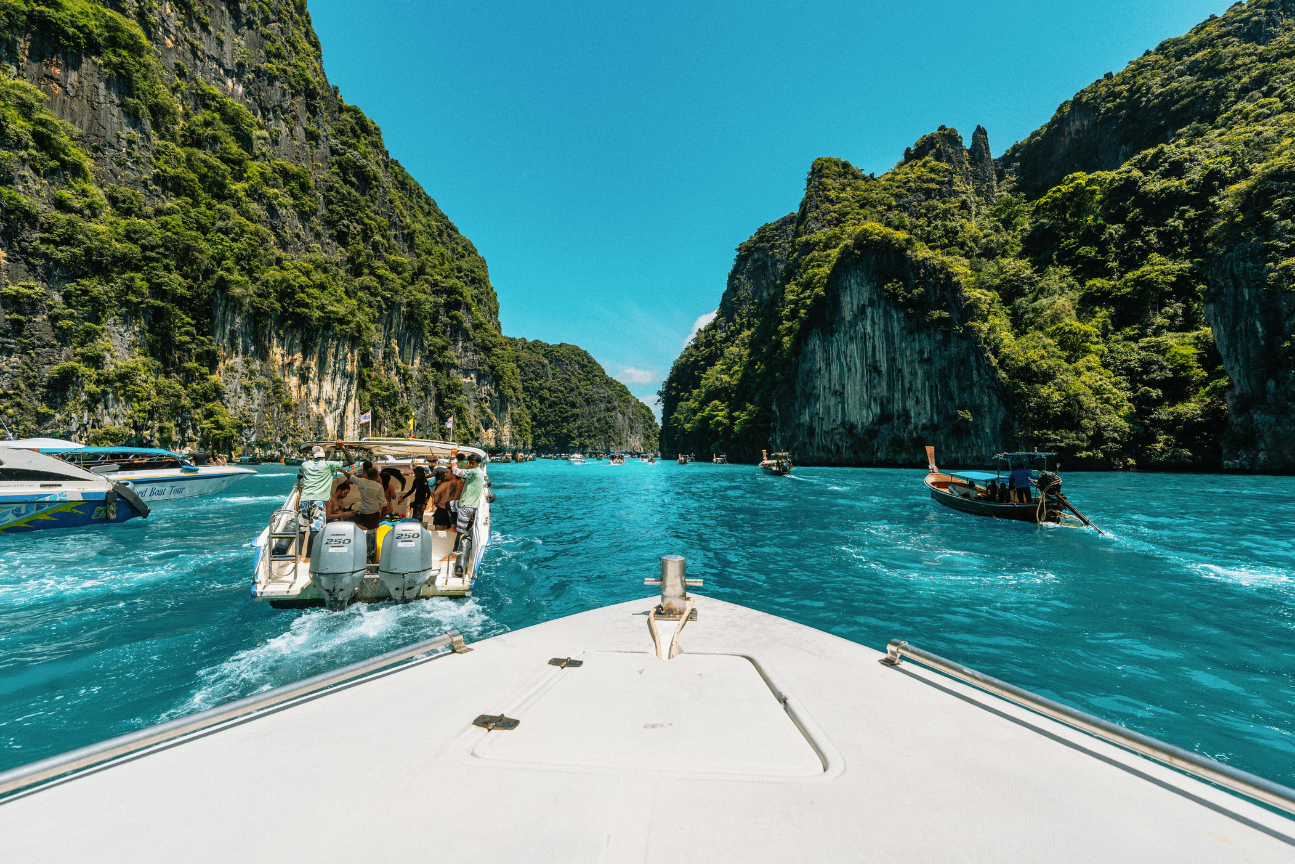Want your destination to be the next must-visit hotspot?
Destination marketing strategies support the growth of a tourist attraction, providing opportunities for these places to stand out and succeed in a rapidly evolving market.
This guide aims to help you attract more visitors by leveraging AI and data-driven tools that focus on personalization and real-time insights, which allows you to reach specific traveler segments and ensure greater engagement, especially in today’s digital age.
When you harness these tools, your destinations can stand out and foster a stronger connection with potential travelers.
Let’s get started.
What is Tourism Destination Marketing?
Tourism destination marketing involves strategies and actions to promote a specific location or destination to attract visitors and tourists. It's about showcasing the experience, culture, and attractions of a place to entice people from around the world to visit.
What are the Key Elements of Destination Marketing?
Destination marketing is a must for travel and hospitality businesses looking to market services toward specific locales. By touting the benefits of your destination, you can inspire users to book a stay.
Some core elements of destination marketing to look out for are:
- Audience data
- Focus on key markets
- Storytelling
- Social media marketing
- Influencer marketing
- Online ads
- Visual marketing
- Video marketing
- Destination branding
- Experiential marketing
What are the Best Destination Marketing Strategies?
The best destination marketing strategies are those that effectively combine digital innovation with authentic storytelling to captivate and engage potential visitors. Embracing these strategies not only attracts more visitors but also fosters a positive and lasting impression of the destination.
Online Ads
An important strategy in our arsenal for tourism destination marketing is leveraging online advertising or digital marketing. This encompasses a wide array of formats, including email, video, social media, native, affiliate, and display advertising.
While the goal is to draw vacationers to a distinctive destination, it's imperative to manage this without compromising the financial stability of your hotel or resort.
Mobile Experience
Mobile is one of the most effective ways for travel companies to share relevant messages with customers at key touchpoints in their travel journey — from dreaming and planning to booking and flying to the in-destination experience, with utilitarian services like check-in reminders and nearby activity recommendations.
Data-Driven Campaigns
Data-driven decision-making is crucial for DMOs (Destination Marketing Organizations) as it enables them to stay competitive in the dynamic tourism market. By leveraging data, DMOs can gain insights into tourist behavior, preferences, and trends, which can guide their marketing and operational strategies.
Data-driven campaigns allow businesses to target and engage their audience more effectively by analyzing user behavior and preferences.
Partnerships
Partnerships with local businesses, hotels, and events can expand reach and offer bundled experiences to visitors. Destination marketing cannot be successful without meaningful community partnerships.
Branding
Branding is crucial for creating a memorable identity for a destination, differentiating it from the competition.
Your hotel brand includes your tone, communication style, logo, and design aesthetics. Having a distinctive brand further separates you from your competitors and gives you a memorable appeal that your audience won’t soon forget.
Visuals
Visual content significantly impacts people's perceptions and decisions. While storytelling paints a vivid picture of what it's like to stay at a vacation destination, seeing the actual offerings is what truly captivates your audience.
Enhance your digital presence by incorporating high-quality images and graphics on your website, landing pages, and social media platforms. Showcasing stunning photos and videos on social media and websites can capture the imagination of potential visitors.
Influencers
If your current destination marketing efforts seem insufficient to attract visitors to a less-known tourist spot, consider leveraging influencer marketing as a powerful ally. Influencers command the attention of a vast and engaged audience, many of whom are willing to explore new products and destinations based on these trusted recommendations.
Personalization
Personalization is a key strategy to attract and retain customers in the travel and tourism industry. By tailoring your marketing messages and offers to the preferences, needs, and behaviors of your target audience, you can increase engagement, loyalty, and conversions.
Why is Destination Marketing Important?
Destination marketing offers a plethora of benefits that can significantly enhance a location's appeal and its economic prosperity. Overall, destination marketing not only drives tourism and economic growth but also fosters a sense of pride and identity for the local community.
- Authenticity in marketing ensures that the message resonates with the target audience by reflecting the true experience and culture of the destination.
- Social Proof, such as reviews and testimonials from previous visitors, influencers, and locals, can significantly boost a destination's reputation and attract more tourists.
- Cost-effective: Destination marketing can be more cost-effective than traditional advertising, especially when leveraging digital and social media platforms to reach a wider audience.
- Viral Potential: Social media and content sharing have the potential to make a destination go viral, attracting attention and interest from globally.
- Improve Engagement and Interaction: Engaging content and interactive campaigns can improve engagement and interaction with potential visitors, building a community around the destination.
- Fosters Job Creation: With the expansion of tourism, new employment opportunities emerge in the hospitality and tourism sectors, offering jobs to locals, decreasing unemployment rates, and uplifting the economic landscape.
- Elevates the Destination's Reputation: By showcasing its distinct characteristics and attractions, destination marketing can improve a place's image and counteract any existing negative impressions or stereotypes.
- Boosts Tourism Revenue: Successful destination marketing strategies can increase visitor numbers, leading to higher tourism-related earnings. This influx of funds can be reinvested to upgrade infrastructure, amenities, and attractions, making the destination even more enticing to future visitors.
Best Destination Advertising Examples
Among the myriad of destination advertising campaigns, some stand out for their creativity, impact, and ability to draw tourists. These campaigns exemplify how innovative and strategic advertising can elevate a destination's appeal and attract visitors from around the globe.
Inspired by Iceland
In 2010, the eruption of Eyjafjallajökul, an Icelandic volcano, disrupted air travel across Europe and sparked numerous misunderstandings about visiting the breathtaking nation. To counteract this, the Icelandic government collaborated with the City of Reykjavík, airlines including Icelandair and Iceland Express, Promote Iceland, and approximately 80 other entities in the tourism sector to launch the "Inspired by Iceland" campaign.
Travel Oregon
Travel Oregon is renowned for its exceptionally creative marketing campaigns, setting a high standard in the industry. Their innovative approaches range from a robotic fish serving as a tour guide to satirical articles, skillfully blending various mediums like print, sponsored posts, social media, banner ads, and video for impactful results.
Doors of Thrones
In 2016, Storm Gertrude wreaked havoc on the Dark Hedges, the famous tree-lined road that served as the backdrop for the Kingsroad in HBO's blockbuster series, "Game of Thrones." Rather than seeing this as a loss, a creative opportunity was seized from the aftermath.
Explore Georgia
"Georgia" utilized social media to showcase its attractions, culture, and events, engaging visitors with compelling content.
How to Measure the Success of Your Destination Marketing Campaigns
Tracking performance metrics is essential for evaluating the effectiveness of destination marketing campaigns. Without clear metrics, it’s challenging to determine how effectively your campaign aligns with your goals and whether it’s achieving the desired outcomes.
Measuring key performance indicators (KPIs) helps in refining strategies to ensure that future campaigns are more effective, which leads to growth in visitor numbers and engagement.
Using Analytics Tools to Optimize Future Campaigns
The travel industry has an average conversion rate of 4.7%, according to a 2021 travel conversion rate benchmark report, but the top-performing companies achieve conversion rates as high as 18.2%.
This simply demonstrates the importance of utilizing analytics to grow your travel business.
Analytics tools, such as Google Analytics and social media insights, leverage data to provide actionable insights about campaign performance. These tools involve tracking user behavior, understanding audience demographics, and assessing which content or strategies are most effective.
If you’re serious about optimizing your marketing efforts for your destinations, these data-driven decisions can help you refine your strategies, identify trends, and ensure your campaigns are more targeted, efficient, and successful.
This, in turn, leads to an increased ROI, which ultimately drives the growth of your destination's appeal.
Tourism Trends: Opportunities for Destination Marketing
Emerging trends in tourism, such as sustainable travel, cultural immersion, and digital nomadism, offer new opportunities for destination marketing.
- Digital marketing has become crucial for destination marketers as the internet increasingly influences travel planning and bookings. Platforms like Instagram, Facebook, and Twitter are key for showcasing a destination's allure, with strategies like influencer marketing, content marketing, and virtual reality experiences gaining traction to attract visitors.
- Sustainability is a growing priority among travelers seeking eco-friendly options, prompting marketers to emphasize green initiatives and responsible travel practices, such as minimizing carbon footprints and supporting local conservation efforts.
- Personalization is shaping destination marketing, with travelers desiring unique experiences tailored to their interests. Marketers are meeting this demand by offering customized itineraries and tour packages, enhancing visitor satisfaction and recommendations.
- Collaboration among tourism boards, local businesses, and governments is vital for a unified marketing approach. Sharing knowledge and best practices with other destinations enhances marketing campaigns and the destination's overall appeal.
Staying ahead in destination marketing requires an understanding of the latest trends. Our exploration of current travel marketing trends delves into personalization and customization, offering insights on how these strategies can be leveraged to attract more visitors in a changing landscape.
Key Takeaways
- Digital Innovation and Authentic Storytelling: Utilizing social media, influencer partnerships, and data-driven campaigns are key strategies for engaging potential visitors and creating a buzz around a destination.
- Sustainability and Personalization: Highlighting eco-friendly practices and offering personalized experiences cater to the growing demand for responsible travel and unique, tailored tourism experiences.
- Emphasis on Local Culture and Collaboration: Promoting local culture and fostering collaborations with local businesses, tourism boards, and other stakeholders enhance the authenticity and appeal of a destination, supporting the local economy and cultural heritage.
Frequently Asked Questions
What are the Success Factors of Destination Marketing?
Destination marketing succeeds through authenticity, engagement, innovation, and personalization. Authenticity highlights uniqueness, engagement fosters emotional connections, innovation keeps destinations fresh, and personalization tailors experiences to individual preferences.
Who is the Target Market of a Destination?
The target market of a destination includes tourists seeking unique experiences, such as cultural immersion, adventure, and specific attractions like scenic views or heritage sites. The key is targeting those looking for something distinctive that aligns with the destination’s offerings.
What is Tourism Destination Demand?
Tourism destination demand refers to how much people desire to visit a place, driven by marketing, reputation, and available experiences that attract and engage tourists. Seasonality, cultural trends, and the destination’s unique offerings all affect this demand.
How do partnerships help in destination marketing?
Partnerships with local businesses, hotels, and tourism boards strengthen your marketing efforts and broaden your reach. This lets you attract more tourists and boost your destination's appeal.
How can I use data to improve my destination marketing efforts?
Leverage data from web traffic, customer behavior, and surveys to refine strategies, spot trends, and personalize content. Use these to enhance engagement and boost conversions.
How can influencers contribute to a destination's marketing success?
Influencers share authentic content with their large, engaged audiences. Their organic posts build trust and encourage their followers to visit your destination.












